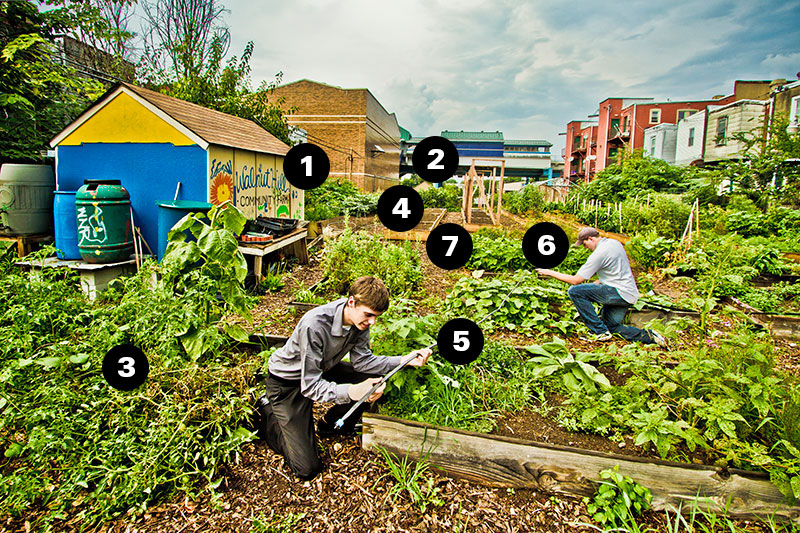Tucked away in a once-vacant lot behind SEPTA’s 46th Street Station sits one of the hidden treasures of West Philadelphia—the Walnut Hill Community Farm. The garden is one of the true success stories of Philadelphia’s nascent urban garden movement, and recently, it received a big boost from students from Drexel’s College of Engineering. As part of a class project, the Drexel students helped create an innovative new irrigation system that will allow the garden to continue to bloom for many years to come. As of press time, the students were also working on additional improvements in the garden, including new tilling machines and even a greenhouse that could allow for year-round urban agriculture. Drexel Magazine visited the site in late summer—just as the farm’s many tomatoes were ripening up—to get a closer look at the students’ handiwork.
-
- THE SIGN: The Walnut Hill Community Farm is a joyful, beautiful place—an oasis amid West Philly urbanity. So it’s only fitting that such a fun, colorful place boast a fun, colorful sign. The brightly painted shed, located on the southern edge of the garden, serves as a sunny centerpiece to the surrounding greenery.
- THE STATION: Looming overhead of the garden is SEPTA’s 46th Street Station, one of the original stations built for the Market-Frankford Elevated line way back in 1907. Trains heading East from the station head underground soon after leaving 46th street. So at the very least, the garden gives those passengers something to look at before they are plunged into subway-induced darkness.
- THE VEGGIES: When we visited the garden in mid-August, we were duly impressed by what we saw: Most of the beds at the farm were growing lushly, with the tomato and pepper plants doing especially well. Other crops at the time included zucchinis, pole beans and even the famously fussy eggplant.
- SOLAR-POWERED CISTERNS: Other gardens boast the services of plain old regular rain cisterns. But Walnut Hill? No, it goes for the next step up—the Mercedes of rain cisterns, if you will. The garden’s two massive, solar-powered water collection devices sit on the backside of the SEPTA station and are each capable of holding 2,200 gallons of water.
- IT’S ALL CONNECTED: The cisterns are nifty and all. And of course, the fact that they can hold a combined 4,400 gallons of water means that the tomatoes and peppers and zucchinis of the garden need not worry about even an extended Philly summer drought. But all that water would be useless if it were not for a reliable irrigation system—and that’s exactly what the Drexel students supplied this past summer. The student team drew up a plan for, and then built, a low-pressure irrigation system that will carry water from the cisterns to every corner of the quarter-acre garden.
- LOW-PRESSURE, LOW-COST: The students’ design isn’t just effective. It’s also efficient—the system uses a great deal less water than the previous hose-based system, and was constructed at a cost of just $100.
- THE RAISED BEDS: The constantly evolving Walnut Hill Farm got a big boost this year when six “raised beds” were installed to help gardeners increase their yield. The beds are easier to work and help plants grow stronger, more expansive roots, but also are more difficult to till, as they are raised roughly six inches off the ground. Another team of Drexel students set out to solve that issue, designing a machine that could be installed on each bed and used to till up soil more easily. The machines were set to be installed in late summer.



